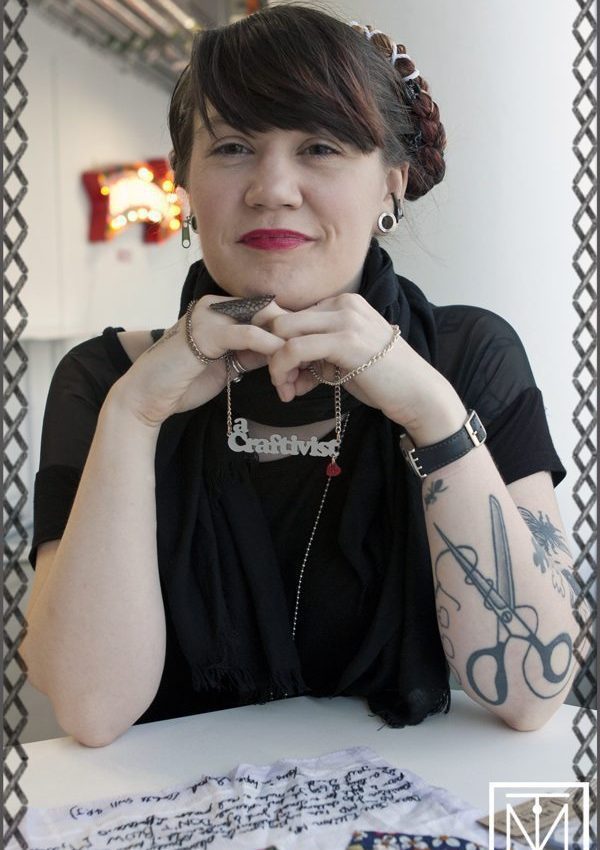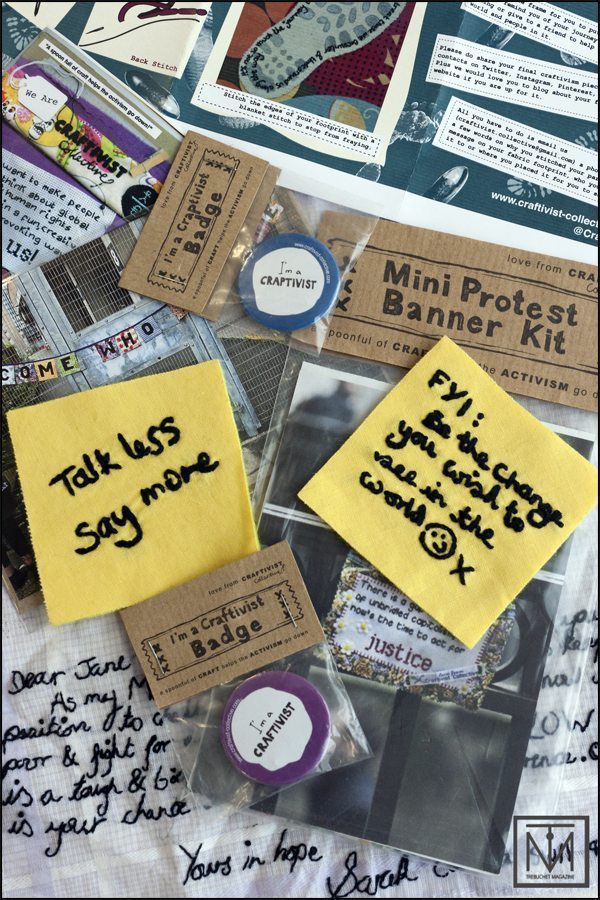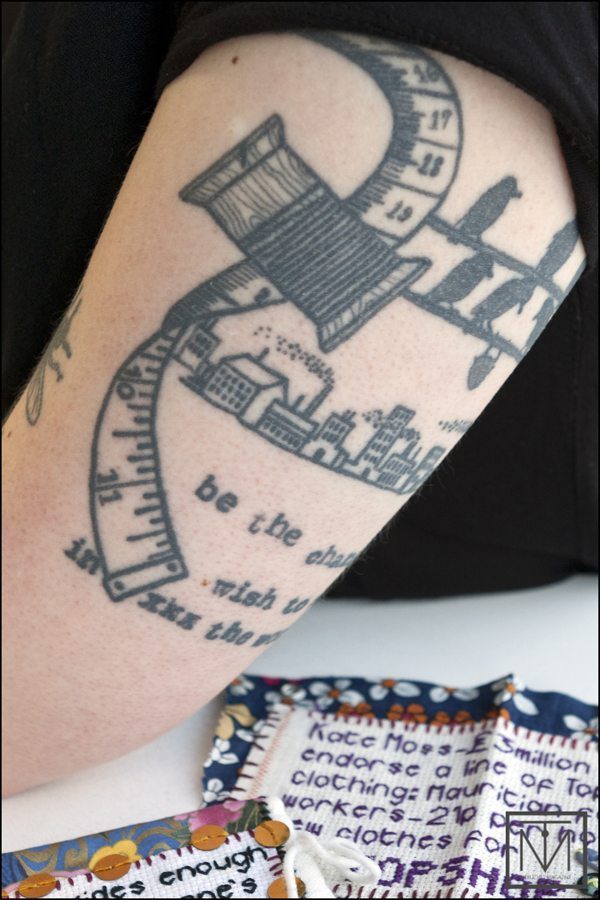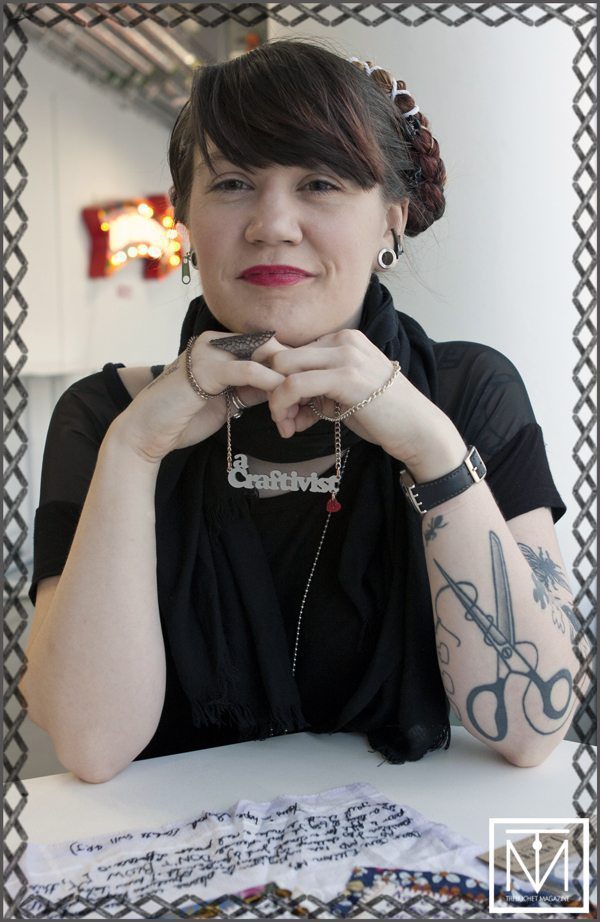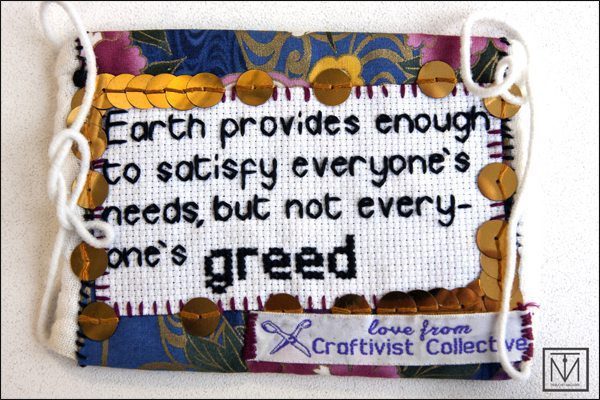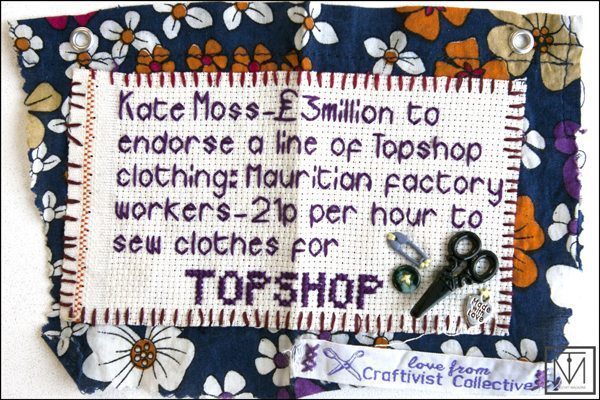[dropcap style=”font-size:100px; color:#992211;”]P[/dropcap]art two of our interview with Sarah Corbett of the Craftivist Collective
In part one of this interview last week, Trebuchet’s Sarah J. Corbett spoke to the Craftivist Collective’s Sarah P. Corbett about the growth of craftivism, practical issues and how craftivism can change and influence people.
In part two, the conversation turns to political art, Tracey Emin and Occupy.
Do you see any links between what you do and the old, large-scale trade union banners?
Everything we do is mini as a reaction to massive trade union banners. I mean I see links because I’m from Everton in the 1980s under a Militant council as well as a Thatcher government, so a pretty dire situation where people were just not heard.
We were getting really good family housing being demolished to set up a park that nobody wanted, that would just create more violence and helped the drug industry in Liverpool because now there was a nice park for them all to hang out in, which was awful.[quote]How can we live in a world
where you’re in your mansion
in your gated community right
next to a family in a tiny house
where the Bedroom Tax is going
to completely fuck them over?[/quote]
I remember at age 5, sitting in and squatting Liverpool housing to save it, with my little red beaker, on the wall, with a Martin Luther King quote on a big banner and people had made it together. All that stuff, you make it together and you hang it up and you say, “We’ve achieved this together”.
I can see how on a lot of marches that’s the way people say, “Look, we’re here, we’re supportive, this is what we’re doing”.
But when it’s a giant, giant banner saying it very screamy or preachy, I think people avoid it and people will walk over the street and go, “This isn’t empowering, this is quite negative”. You can see that people are angry but I think that if you’re not with them directly and have felt that and gone through that experience, it’s quite hard to connect to it without feeling really drained and negative.
All of our stuff is a reaction to big billboards and big banners. It’s small so you have to make an effort to go to see it. You see it waving in the wind with a sequin on and you go up.
Because of technology and advertising now, we’re so used to ignoring things, that our stuff is the opposite. We’re not going to put it in your face. We’re going to put it off eye level so you have to find it but then people are more likely to Tweet it and Instagram it and remember it and feel like they’re not being screamed at but this is an important message that someone’s spent hours making, so it’s that much more of an emotional tug.
What do you think about Tracey Emin and her use of craft in her art? Has her work influenced you in any way?
Well she’s a raving Tory! She talks a lot about herself all the time, so no!
We did a workshop on top of the Hayward (Gallery) roof as part of her retrospective; we got seventy people there, which was nice and full. It was all about how Tracey Emin’s exhibition is about love but was about who loved her and whom she loved; it’s very individualistic.
It’s always shocking because she thinks she’s experienced a lot of poverty and a lot of deprivation and she’s relied on a lot of services that government’s provided and now she’s completely against it all.
So we did a thing about love your global neighbour and about how do we show our love to people. So it’s still quite vague but it means people don’t feel forced and brainwashed into a certain thing. They can have a proper think about what it means to them.
You’re always going to be inspired by different artists and I do think some of her work is powerful but I don’t see her as an activist.
She paid for a library somewhere in Africa and it was on a bit of land that they grabbed from other communities. If you’re going to help the children in Africa, see if it’s ethical or not. If you’re land grabbing off the local community, it’s just shocking.
All of our stuff, like the little book I’ve just written, all over it says stuff like: make sure you’re in small groups; you don’t initiate the conversation, they do. It is all about: you do the thing and then people will be much more likely to ask you.
Rather than me sitting here going, “Does anyone want to ask me what I’m doing?” I just sit and do it and then people can decide if they want to ask me. Then they’re much more likely to engage in the issue, they’re more likely to take ownership of their thoughts because they’ve engaged in it.
That’s not about urgent campaigns like Syria, that’s just about the foundations of how we can be better human beings which then has a knock on effect on what we buy, what we vote for, how we react.
So that’s the layer we’re going for, it’s not the: “We’re going to eradicate sweatshops and we’re going to change the agenda of the G8”. It’s about, before we even try to do that, if our foundations are rocky and not right then we’re not ever going to be that effective.
So we’ve got to look in ourselves and do things small and just remind people that activism should be threaded throughout our lives and not something you just opt into once a month.[quote]I want people to use it
as a tool to remind them
to be better people and to
open up good conversations[/quote]
You do see a lot of activist groups screaming or dressing up and doing lots of performance and I think a lot of that’s really brilliant but it can also be quite aggressive and you don’t want to engage in it even if you know the issue is really good.
You don’t want to be preached at. You don’t want to be told all the bad stuff and how awful the world is. It’s not particularly empowering long-term.
What do you think of subvertisement?
Like culture jamming stuff? Again I think it can work. A lot of our stuff, I’ve realised over the last year, is about the message sometimes more than the medium.
You get a lot of people now using the term “craftivism” saying, “Right, I’ll just use craft but I’ll do the same old stuff. So we’ll do a message that we’d normally have on a placard saying ‘Get out’ or whatever but we’ll do it in craft and therefore it’s craftivism”. I didn’t coin the term but our approach is very specific.
So if you’ve got on George Osborne’s face, “You’re a knob head”, well I might think that and I do scream at him on TV thinking how can he sleep at night, but how is that going to help? When you see the people doing black methods, just screaming and shouting at stuff, people don’t listen and often it will discredit their whole message because of the way they’re acting.
I think it’s much better to write underneath it, “I’m upset and worried. How do you sleep at night?” for people to go, “What does she mean? Why shouldn’t he sleep at night? Why is she upset?” rather than, “You’re a knob”. I think that’s just really lazy and not helpful at all. The same with really negative stuff about people, I just think it’s a bit stupid really.
How would you respond to people who say that it’s all a bit too vague?
That’s why everything’s online with hyperlinks to go, “Here’s something to provoke you to think about it. Now if you want, here’s more info.”
But we’re not going to say just: “Stop the badger cull” because people go, “Oh right, ok,” it doesn’t give people time to stop and think. Because our stuff is a bit ambiguous, and purposefully that way, it means people have to use a bit of an effort.
We’re so used to seeing, “Buy this, do this, you’ll look like this if you buy that lip gloss”, that you’re not engaging deeply in it.[quote]I’m really proud that we have
a column in a craft magazine
every month on activism and
it’s read by crafty people[/quote]
The footprints is about your journey and we’ll have hyperlinks to different things, which is really vague, but then the London Fashion Week is very specific with lots of hyperlinks saying you can sign this petition here, you can do this with your MP, you can do this and get the message out there, but it’s still, you have to put your personal stamp on it because I don’t want anyone feeling like they’re a robot. It has to be their choice.
If that means we get 50 people instead of 50,000 people signing an online petition then at least you know those 50 people really care and have thought deeply about it instead of being treated just like activist robots.
There are loads of charities around the world now and loads of people sign petitions but are they acting out what they’ve signed? It’s like there’s a real disconnect there and charities know that, they’re just scared of acknowledging it, I think.
Where do you draw line the line? What would you do if someone came to join in with a craftivist project but had different politics?
Yeah, I know, it’s really hard. I think the whole point is that it’s a discussion point. So whether you leave it out and it’s discussed online or in physical groups, the point is that craft groups are so unique in that it’s such a safe, welcoming space for people to join and have really honest discussions.
I’ve never been in a group where people are so honest about their personal opinions or what they’ve gone through but because you’re crafting, it just naturally comes out. I haven’t had that in an activist group. Craft has just got something, I don’t know how, I think it’s because it’s so soft and meditative. There are all these reasons why it’s a safe environment, especially if it’s a small group, which is what we always focus on.[quote]All of our stuff is
a reaction to big
billboards and
big banners[/quote]
I love it when people come with completely different ideologies because we can all challenge each other. You need to know the other opinion to help you with your campaigning and with your own opinion. In our family all we do is be Devil’s Advocate when we have chats. It’s like, “Well what if you thought this?” and “How would you justify your position if someone asked that?” That only helps you get better and challenges what you’re doing.
If it challenges you to go, “Shit, I don’t know how to answer that”, then you look it up so you’re even more knowledgeable on it. So I think it’s brilliant.
I think it’s hard when people go, “Right I’m going to use your banners to say the welfare state shouldn’t exist and these nanny states are awful” and you challenge people on that. I’ve met lots of people with different opinions to a point but luckily we’ve never had anyone use it for anything really negative. I think people challenge each other in the groups and go, “Hang on a minute, I’m not sure about that”.
What would you do if, for example, someone started stitching that they thought immigrants were to blame for all the problems?
Because everything needs to be pretty timeless, because it’s physical, so it can always be used, you can say what do you want your MP to do about it but not be specific. Then you can say on immigration, “Why do you think that? What do you want your MP to respond on?” You try to have a chat with them.
One of my friends still buys in Primark and it really upsets me, especially after the Bangladesh factory, and she made a sweeping comment a few weeks ago when I said, “I’m not going to go to that shop because it’s really unethical and I’m trying to avoid it”. She made a comment like, “Oh that’s your thing but I’m going to go in”.
It was haunting me for the last few weeks literally, I was thinking that I’m not a very good activist if one of my best friends does this and am I’m a hypocrite for saying that this can help when I’m really nervous to say stuff to my friend.
I’ll try to hint at stuff but it wasn’t until we went to an event where we had to wear ethical clothing that I had to say, “You can’t wear your Nike shoes there; we’ve got to represent the craftivists”. Then she wrote a blog about it basically saying it really made her think and she was looking in her wardrobe and what she was thinking.
I think all of that over a few years has culminated and got her on the right step. She never was political with the craft stuff. She came because she liked street art and the performance side of putting it up and doing the creative side.
Now it’s taken her three years to think more politically but it needs to be in her own time. I know there are urgencies of certain things but again our stuff is all about people figuring it out for themselves.
So with the immigration woman, I’d hope I could stay in touch with her and we could have chats and talk about other stuff and if she says, “Oh yeah, the way people are treated in the UK is awful”, you could say, “That includes immigrants and they bring a lot of money to the country,” and you’d hope that we could have a good chat and she could challenge me and I could challenge her.
Would you ever say to anyone that their opinions were such that you didn’t want them to use your stuff?
I’ve said to a few blogs, “We’re not putting that up”.
Also because I can build up relationships with people and explain very clearly, “We’re not putting this up because it’s demonising or you’re telling people what to do, which is not what we’re about. It doesn’t fit our ethos. I hope you understand. I’m happy to talk it through with you,” and I can be really personal and do one-to-one emails.
It’s hard because of the amount that comes through but I really try to make an effort to write really long, bespoke communications with people.
Normally the response, 90%, is people going, “Oh right, I get it. I understand that. Sorry about this. I was a bit angry so it all came blurting out” and you can say, “Yeah, our first reaction to this is that it’s bloody shit, so we need to scream and shout about it, which is why we craft, to slow down and think strategically”.[quote]I don’t want anyone
feeling like they’re a robot.
It has to be their choice[/quote]
It normally helps people along the journey of thinking much more deeply than just saying, “Stop this!” You learn from mistakes better than doing everything perfectly.
It helps me think, “How do I write this better and how do we communicate that?” I love people giving me constructive feedback so I’d rather that and I hope other people don’t mind it. So we have a few people going, “What?” but then at least you’ve planted that seed of what we’re about.
We often have good discussions on the Facebook wall when people post stuff up and you say, “OK, well what’ the activism message there? Nice bit of yarn bombing, but what are you trying to get out of that? Why would you call it ‘craftivism’ and not ‘yarn bombing’?” There are enough of us to try to do it in a loving way.
Some people go, “Oh right, yeah, so maybe it is yarn bombing and I shouldn’t have put it up but I’m thinking about this,” and it’s a space for people to think, which I don’t know if other places have.
Then we will say to people, “Right, you’re really keen on this campaign. Go to that charity, do this lobbying”. We signpost people to stuff on their journey but ours is like the bridge so that they can then go off and do stuff and hope that they still have our little checklist in their mind of: “Don’t scream at people” and so on.
But you know it’s never going to be perfect, no activism is. If there was an easy answer to the world’s crap then we’d all be doing it.
For us it’s much more long-term, it’s not about the policy wins, it’s about as human beings, how do we engage people, how do we challenge ourselves to be our best selves and challenge others to be their best selves and just be good human beings.
Do you have any involvement with Occupy?
We avoid them because we’re all about reaching people who aren’t politicised. We got a bit of flack for London, loads of groups were saying, “Come to Occupy”.
We went to South Kensington and put a mask on outside the station and did stuff round there, where Occupy wasn’t, to engage people much more softly and slowly.
Some of it was great in terms of Occupy and I love the 99%, I just think that’s such a strong message. But that’s not our strength, our strength is not in going there, it’s not a great use of our time.
Some craftivists went on their own and did stuff, so we had a few people put up little banners on tents but you can only stretch yourself so thin and our focus is to help with the bridge and to go to places where Occupy might not be invited.
We’ve worked with the Tate a few times and a lot of activists have gone, “How could you? With the oil and everything?” But we’re engaging people in those issues. We’re saying it in the Tate whilst being paid by the Tate.
They asked us to do workshops on the area of political art. We talked about oil, we talked about inequality, we talked art and the power of it. They were really good about letting us talk about that stuff and they had the budget to help us with the resources so that the workshop was free for young people.[quote]activism should be threaded
throughout our lives and
not something you just
opt into once a month[/quote]
You’ve got to think of the pros and cons; nothing’s pure at all. If we can go there and engage their young people, the Tate Collective that sets up events in the Tate, to think about the Tate and think about how their art can be used in positive ways then I’m happy to do it.
I do worry about activist communities putting people off from joining because it can be a bubble or elitist or very negative.
Obviously some of the people at Occupy were full-time activists…
No, lots of people took time off work to go. My friend took a week off.
Exactly, there were people who took time off and people who just went in the evenings. Do you feel you missed an opportunity to engage with people on the edge of the movement who weren’t hardcore activists?
I’d worry that people would use our hankies to do their own thing, like you were saying earlier. I’d worry that there would be extremists using them and then people would see it and go, “Oh no, it’s only for the hardcore activists, that puts me off”.
I’ve got to tread carefully. I’ve spent four years really slowly tiptoeing up to crafty people and introverted creatives going, “This isn’t that scary, this isn’t all about extreme thinking, this isn’t about telling people what to do or think, this is something that you can use,” and there is a worry that when people put up mini protest banners with an anarchist sign on saying: “This is all shit” that those crafty people then back away massively going, “Right, this isn’t for me, this isn’t what I’m bringing to the table”. So it’s too much of a risk.
I’m sure I’ll get loads of people going, “She’s awful,” but I would rather try to engage people who are difficult to engage than go into Occupy.
A lot of people put up little banners, loads of people said they were going, so it’s just finding the right place to be and prioritising. But I don’t think it was the priority for us really.
So what is the main priority over the next few years for the craftivism movement?
I never talk about the craftivism movement because we’re just part of it, we never coined the term and we do a very specific approach to craftivism which is different to a lot of other stuff.
I’m really proud that we have a column in a craft magazine every month on activism and it’s read by crafty people and is just part of the magazine; it’s not seen as “here’s how you buff up your halo”!
I want activism and I want people thinking about how they affect the world personally and in a group and all of that stuff as a natural thing and not something that they can just opt in and out of.[quote]Because our stuff is a bit
ambiguous, and purposefully
that way, it means people
have to use a bit of an effort[/quote]
I want people to go, “Oh yeah, craft, yeah I could do craftivism” or “I do craftivism as part of my craft” or “Oh yeah, I’ve got that print in my house to remind me to think about where I’m banking and is it ethical banking”.
I want people to use it as a tool to remind them to be better people and to open up good conversations. I want people to see that as well as using the tool, it’s also about the messaging. You know, if we are just screaming at people, can we have a think about that first and before we go and do stuff, can we try to reflect on it a bit and meditate on it a bit and have a think and a chat and see if we’re doing this in a positive way or if we’re just screaming.
In the UK context that’s going to be different to the Russian context or Iraq or wherever but where we are, I think there’s a need for that.
What do you think are the most pressing political issues at the moment?
Well again, I think we try not to be super-specific where people can forget everything else and go, “I’m just going to focus on sweatshops”.
I try to talk a lot about inequality. Poverty and injustice is complex, everything’s intertwined so let’s not just say there’s an answer for this because that’s ridiculous, but inequality is enormous and fuels a hell of a lot.
The more unequal societies are, the more violence there is. People on the low-income side die early, are super-stressed out, can’t work, are really under confident, there’s a real vicious cycle of going in and out of prison, everything’s connected.
How can we live in a world where you’re in your mansion in your gated community right next to a family in a tiny house where the Bedroom Tax is going to completely fuck them over? How can we as human beings let that happen?
So for me, the biggest thing is inequality, it’s an enormous issue.[quote]I do worry about activist
communities putting people off
from joining because it can be
a bubble or elitist or very negative[/quote]
Obviously that comes from where I’m from as well and just seeing people who have amazing talents and are bloody hard working but the structures keep them poor or stereotype them so that they can’t fulfil their potential. You just think, it’s just not right. So human rights and inequality are enormous issues for me.
But I do want people to look much more holistically at life, rather than just go, “Right, we’re going to look at this”.
Charities are brilliant at looking at the policy of certain issues and what’s an opportunity to change policy and what’s an opportunity to engage certain companies and people, so what’s the point in me doing that?
My aim is to look at things holistically and then you can offshoot onto all of those bits and we’ll tweet all the time about like the G8 campaign we did with Save The Children. This was us saying: “This is our opportunity to be part of the solution, not the problem, let’s get your MP to do the same”.
So we’ll always have key campaigns to focus on but we’ll always bring it back to: “What are you thinking as a person? What are you doing that’s good, that’s bad? What contacts do you have that you can influence? Are you in a mum’s group? Do you work for a bank? Are you in the media where you’ve got a voice to get people thinking?” But that’s where I think our strength is rather than joining Occupy.
You spoke earlier about the potential benefits of craft to prisoners – is this something that you’d like to pursue?
I do a lot with Fine Cell Work, so we support them massively and it would be great if you could give them a mention! Every Christmas and often Easter, a group of us go to their tiny office and help make kits for the prisoners. They’ve asked me to go in and maybe do a talk about what I do and ask them what they do.
I’d love that, to get their view on it and have a good natter with them. But I don’t have the time and I can’t afford to be a volunteer and I’d love to but you have to go in regularly so that they have continuity and I couldn’t do that. It’s horrible if you don’t have people doing regular stuff, if you’re quite unstable as well and you build trust with someone and then they leave.
We encourage people to do it if they’re doing it for the right reasons rather than, “Look at me with a prisoner!” So you’ve got to be sensitive about all this stuff.
What is the priority – changing the world or changing your self?
It’s always self first. We really focus on transformative action so helping you transform and then help others slowly think and help them transform.
So if people do lots of stuff super-quick, I’m like: “Whoa, is this helping you long-term or are you just in the motions. You’ve got your own little sweatshop of you making everything!”
Do you find that people are sometimes too focused on results rather than the process?
Sometimes and that’s why all of kits and videos and workshops and stuff we do, we have a time when we say you’ve just got to sit on your own and do it with a bit of music.
We have loads of case studies and questions, so we say: “Read this little case study, have a think about it. What would you do in this situation? What do you think this links to?”
So we make people work bloody hard, we never make it easy and we shouldn’t because these are complex issues.
It’s also about people taking these things and going, “Right, ok, what do these things mean to me?” So the more it’s about questions and dot dot dots on the mini banners and slogans and lyrics, the more people have to think about it. I’d much rather have someone ask me a question than scream at me or tell me how to think.
Part one of this interview can be read here
http://craftivist-collective.com/
http://www.finecellwork.co.uk/
Photos: Carl Byron Batson

